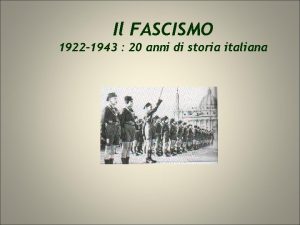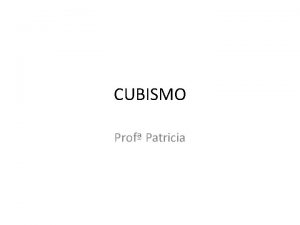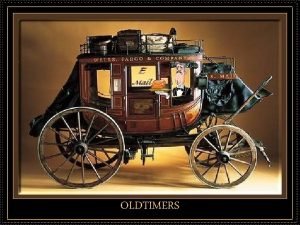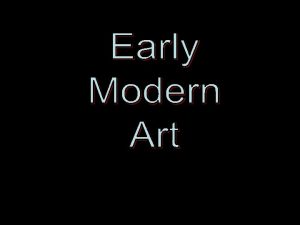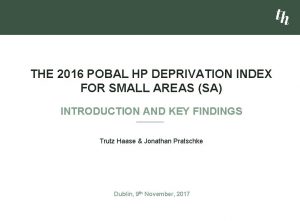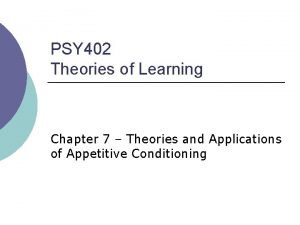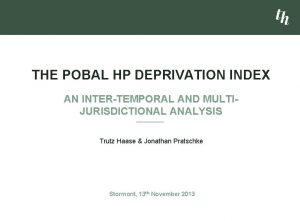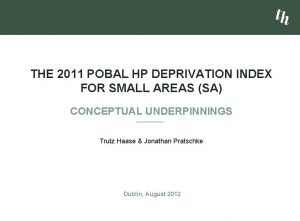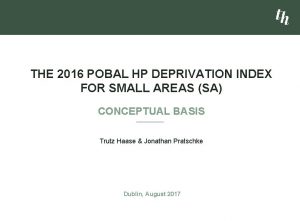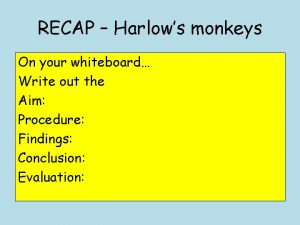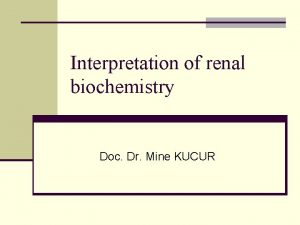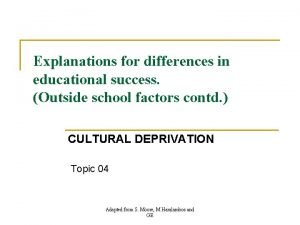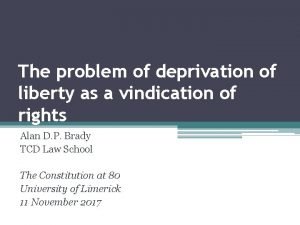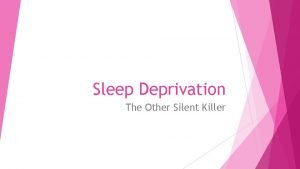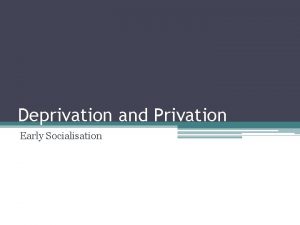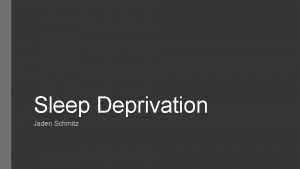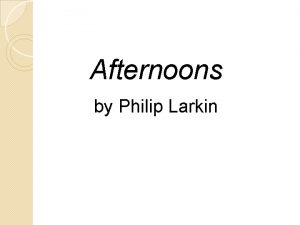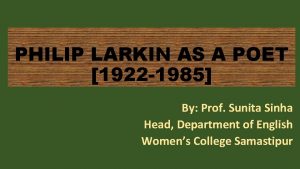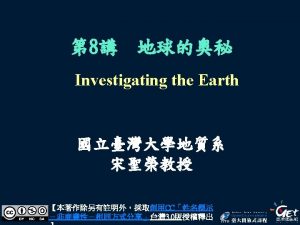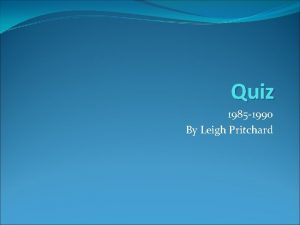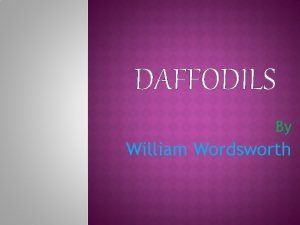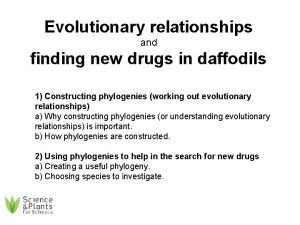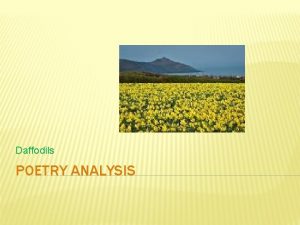1922 1985 Deprivation is for me what daffodils




























- Slides: 28

1922 1985 Deprivation is for me what daffodils were for Wordsworth. - Philip Larkin

Women All That Jazz Poetry & Fiction Life Story Day Job What was said

The North Ship was Larkin’s debut and first published book in 1945. A collection of poems in a highly romantic style in which it was obvious that Larkin had been heavily influenced by the poetry of Yeats. No notice was taken of the book at the time and most critics today regard it separately from the rest of Larkin’s books and use it only as evidence pointing towards his evolution of style and form. Larkin had two novels published in 1946 and 1947, Jill and A Girl in Winter. Although the novels received little critical attention when they first appeared, they have since been judged highly successful. Jill was published in 1946 and this novel follows a young scholarship boy from the North of England through his first term at Oxford. It has been noted as one of the better novels written about England during the Second World War. A Girl in Winter follows a young female librarian through one winter in North England. The New York Review of Books called the novel “a real masterpiece. . . a quietly

The Whitsun Weddings represent the full flowering of Larkin’s poetic talents. The concern with realism in the poems is combined with Larkin writing many of the poems in the third person or first-person characters that are not Larkin himself. Published in 1965, this collection completed Larkin’s shift in style - moving away from Yeats and Auden towards the poetry of Thomas Hardy. Larkin learned from Hardy how to make the commonplace and often dreary details of his life the basis for extremely tough,

Remarked upon in its day for its’ ‘foul’ language, High Windows stands today as Larkin’s most influential and substantial collection. Larkin draws together all of his literary resources - lyricism. social comment, narrative form, technical expert, and sour wit - within a instantly recognizable and distinct tone. It is a voice which for all its extrodianary skill is not in the least intimidating and readers identified with it. The world Larkin described was theirs and so was Larkin. High In 1985, the into year of death, Philip Larkin, a big, fat, bald librarian Windows turned him a his national monument was unquestionably England's unofficial laureate. Our best-loved poet since the war; better loved for our poet than John Betjetman, who was loved also for his charm, his famous beagle, his patrician Bohemianism and his televisual charisma, all of which Larkin notably lacked. Ten years later, Larkin is now something like a pariah. The word "Larkinesque" used to evoke the wistful, the provincial, the crepuscular, the unloved. Now It evokes the scabrous and the supremacist. The word "Larkinism" used to stand for a certain sort of staid, decent, wary Englishness. Now it refers to the far right. In the early eighties, the common mind imagined Larkin as a reclusive drudge, bespectacled, bicycleclipped, slumped in a shabby library, gaslight against the dusk. In the midnineties however, we see a fuddled Scrooge and bigot, his singlet clad form barely visible through a mephitis of alcohol, anality and spank magazines. The reaction against Larkin has been unprecedentedly violent as well as unprecedentedly hypocritical, tendentious and smug but in a sense, -Martin none of. Amis

“ 1943 1946 1950 1982 Philip Larkin graduated First Class Honours from Oxford University earlier in that year he had failed his army eyesight test and was therefore able to complete his degree uninterrupted. Larkin was living at home writing a novel when the Minister of Labour wrote asking what contribution he was making the war effort. Larkin, wishing to avoid giving the Minister of Labour an excuse to exercise upon him the powers of direction, accepted his first offer - librarian at a small public library in Wellington, Shropshire Moved to a new job as Assistant Librarian at the University College of Leicester. He completed his course of professional studies and became an Associate of the Library Association in 1949. His duties in the library included issuing books and answering their questions, resolving returned books, cataloguing books and writing out cataloguing cards by hand. Appointed sub-librarian at Queens University in Belfast. Resigned in 1955 to take up the post of Librarian at the University of Hull which he held until his death. Made a Professor by the University of Hull

Larkin’s Contribution 1 Philip Larkin pioneered new techniques and introduced methods which have been copied in other academic libraries in the United Kingdom, He has been responsible for the introduction of the University Photographic Service; persuaded the University of Hull to open two new library buildings; built up a distinguished national collection of manuscripts; celebrated the library’s 50 th anniversary with a pamphlet history; 2 defended its integrality in a celebrated dispute over access 3 which resulted in the Publisher’s Association withdrawing the University’s library license in 1973 ; and in 1980 pioneered the introduction of a new computerized and automated circulation system from Canada. His best known, and most important library activity though, was his stint as the first – and only- Chairman of the Arts Council Committee on the National Manuscript Collection of Contemporary Writers where he persued the idea of the collection and provision of money to subsidize the purchase of such manuscripts by libraries and make sure important literary manuscripts remained in England. Work vs. Art Larkin occasionally regretted that his work was not his art, that he was a full time librarian and not a full time writer. This idea of Larkin’s attraction and repulsion towards work comes out in two of his better known poems, “Toads” and “Toads Revisited”. He allows his work to ‘squat’ on his life but sees something toadlike within himself too.

Prompted when students protested his actions, as librarian, in devising a schemes to prevent the stealing of books and deemed him too far on the right. Thus prompted the occasion when Larkin told the local student protest leader (who had won fame by refusing to take his exams) that he could only win real respect by setting fire to himself. “Philip thinks of his brochure The Brynmor Jones Library 1929 -1979 as his ‘last book’. I hope it is not for if he feels he has no more poems he wants to write, he has a book about libraries in him, one which would be a fine addition to our professional literature. ” Douglas Dunn, Poet, writer, and former librarian. “It’s that nice little Shetland pony of a job you so confidently bestride in the beginning [which] suddenly grows to a frightful Grand National Winner. ” Larkin, speaking of his position at Hull

Philip Larkin on Reading Poems Aloud I have never seen why poems need to be read aloud. Anyone so bereft of aural imagination that he can't hear what the words sound like in his own mind is not likely to get far with them on any other terms. And what you gain on the sound you lose on the sense: think of all the mishearings, . . . the submergence of rhyme, the disappearance of stanza-shape, even the comfort of knowing how far you are from the end! No, the proper medium for the modern meditative non-communal poem is the silent eye on the printed page. However, I suppose it can be said that when we have really absorbed a poem, . . . there comes a moment when we want to hear it read as its author would read it. . It was very much in these two minds that the forthcoming recording of The Whitsun Weddings was made. . " Taken from a note by Larkin on an LP record of The Whitsun

Why should I let the toad work Squat on my life ? Can't I use my wit as a pitchfork And drive the brute off ? Six days of the week it soils With its sickening poison Just for paying a few bills ! That's out of proportion. Lots of people live on their wits: Lecturers, lispers, Losels, loblolly-men, louts They don't end as paupers; Lots of folks live up lanes With fires in a bucket, Eat windfalls and tinned sardines They seem to like it. From: The Less Deceived Their nippers have got bare feet, Their unspeakable wives Are skinny as whippets - and yet No one actually starves. Ah, were I courageous enough To shout stuff your pension! But I know, all too well, that's the stuff That dreams are made on: For something sufficiently toad-like Squats in me, too; Its hunkers are heavy as hard luck, And cold as snow, And will never allow me to blarney My way into getting The fame and girl and the money All at one sitting. I don't say, one bodies the other One's spiritual truth; But I do say it's hard to lose either, When you have both.

Dawn To wake, and hear a cock Out the distance crying, To pull the curtains back And see the clouds flying How strange it is For the heart to be loveless, and as cold as these. From: The North Ship

Wires ------------------------------------The wildest prairies have electric fences, For though old cattle know they must not stray Young steers are always scenting purer water Not here but everywhere. Beyond the wires Leads them to blunder up against the wires Whose muscle-shredding violence gives no quarter. Young steers become old cattle from that day, Electric limits to their widest senses. From: The Less Deceived

I Remember, I Remember I never ran to when I got depressed, Coming up England by a different line The boys all biceps and the girls all For once, early in the cold new year, We stopped, and, watching men with number plateschest, Their comic Ford, their farm where I Sprint down the platform to familiar gates, could be 'Why, Coventry!' I exclaimed. "I was born here. ' 'Really myself'. I'll show you, come to that, I leant far out, and squinnied for a sign The bracken where I never trembling That this was still the town that had been 'mine' sat, So long, but found I wasn't even clear Which side was which. From where those cycle-crates Determined to go through with it; Were standing, had we annually departed where she Lay back, and 'all became a burning For all those family hols? . . . A whistle went: mist'. Things moved. I sat back, staring at my boots. in those offices, my doggerel 'Was that, ' my friend smiled, 'where you "have your. And, roots"? ' Was not set up in blunt ten-point, nor No, only where my childhood was unspent, read I wanted to retort, just where I started: By a distinguished cousin of the mayor, By now I've got the whole place clearly charted. Our garden, first: where I did not invent Who didn't call and tell my father Blinding theologies of flowers and fruits, There And wasn't spoken to by an old hat. Before us, had we the gift to see And here we have that splendid family ahead 'You look as though you wished the The Less Deceived place in Hell, ' My friend. From: said, 'judging My friend from your said, face. ''judging 'Oh well, from I suppose your

A Study of Reading Habits When getting my nose in a book Cured most things short of school, It was worth ruining my eyes To know I could still keep cool, And deal out the old right hook To dirty dogs twice my size. Later, with inch-thick specs, Evil was just my lark: Me and my coat and fangs Had ripping times in the dark. The women I clubbed with sex! I broke them up like meringues. Don't read much now: the dude Who lets the girl down before The hero arrives, the chap Who's yellow and keeps the store Seem far too familiar. Get stewed: Books are a load of crap. From: The Whitsun Weddings

From: The Whitsun Weddings

This be the verse They fuck you up, your mum and dad. They may not mean to, but they do. They fill you with the faults they had And add some extra, just for you. But they were fucked up in their turn By fools in old-style hats and coats, Who half the time were soppy-stern And half at one another's throats. Man hands on misery to man. It deepens like a coastal shelf. Get out as early as you can, And don't have any kids yourself. From: High Windows

Annus Mirabilis ----------------------------------Sexual intercourse began In nineteen sixty-three (Which was rather late for me) Between the end of the Chatterly ban And the Beatles' first LP. Up till then there's only been A sort of bargaining, A wrangle for the ring, A shame that started at sixteen And spead to everything. The all at one the quarrel sank: Everyone felt the same, And every life became A brilliant breaking of the bank, A quite unlosable game. So life was never better than In nineteen sixty-three (Though just too late for me) Between the end of the Chatterly ban And the Beatles' first LP. From: High Windows

Larkin & Women Larkin (at heart an anti-social) found women difficult, awkward, and alluring. He makes Ruth Bowman 'a garbled proposal of marriage', driven by 'the maggot of loneliness, the maggot of romantic illusion, 'the maggot of sexual desire'. She inconveniently accepts, and he has to slink out of the trap, feeling foolish. A clandestine affair with Patsy Strang ends with her marriage to Richard Murphy, to Larkin's seeming relief, and when later she dies a drunken death, all he seems to feel is a fond queasiness. Other liasions follow with women colleagues, but their attempts to cast him roles in their gamesmanship sprees remain unanswered: 'what can one say? '. And yet he maintains such friendships for many years, three long relationships with dramatically different types of women, and cares for Monica Jones while she is ill, bringing her back to Hull.

The Young Philip Larkin The only son and younger child of Sydney and Eva Larkin. Sydney was City Treasurer of Coventry 1922 -44; he died from cancer in 1948 at the age of 63. Eva lived to be 91 and died on 17 November 1977. The family lived in Coventry 1922 -40. In Andrew Motion’s biography of Larkin the author establishes that Larkin's father was a Nazi sympathizer, as well as a misogynist and an autocratic parent, and that the poet's `whining'' mother exerted an equally debilitating influence on her sensitive son. Tall and gawky, young Philip stammered and made few friends: This overwhelming sense of isolation stayed with him even through his years of critical acclaim. At Oxford, Larkin formed his legendary friendship with Kingsley Amis, whose fame and talent he would continually envy even as they shared a love of jazz and drinking, as well as a hatred of pretension. Larkin experienced difficulty with girls, not losing his virginity until well into his first job as a librarian. The obsessions of Larkin’s verse--sadness, death, failure, sex, parents--seem to flow directly from his unfondly remembered early life.

Philip Larkin and Mother

Contained in the letters: Larkin's misguided sympathy for Germany in the early years of WW II, his cranky xenophobia, his outrageous misogyny, and his devastating put-downs of other poets (especially Stephen Spender, Ted Hughes, and Vikram Seth). After all, his problems with women, his severe melancholia, and his deep- rooted misanthropy are everywhere evident in the poetry. In his own words, Larkin is a constant pleasure--witty, slangy, and full of profound insight into the writers who matter most to him, from his early admiration of Auden, Lawrence, and Yeats to his later veneration of fellow plainspeaking poets such as Hardy, Edward Thomas, and Gavin Ewart. Heavily represented among the recipients of these 700 -odd letters are Larkin's grade-school buddies, publishers, and a few solid literary friends. With his pals, Larkin indulged his love of vulgarity: A proud masturbator, he trades soft-core porn tips with his kindred spirit, Kingsley Amis, and with poet-historian Robert Conquest. Larkin's lifelong devotion to jazz surfaces not only in his numerous discussions of favorite albums but also in the rhythms of his prose. Most touching of all, though, is the poet's long epistolary friendship with Barbara Pym, a lovely testament to their spiritual affinity--they didn't meet until very late in their correspondence. Editor Thwaite (one of Larkin's three executors) never adequately explains the most glaring omission here--the poet's letters to family members. But to Thwaite's credit, he annotates with a light hand, ensuring that no one interested in Larkin or the course of modern poetry can afford to ignore this spectacular volume. -- Copyright © 1993, Kirkus Associates, LP. All rights reserved.

Philip Larkin was a professional jazz critic at for the Daily Telegraph beginning in 1961. . Whilst a major fan of earlier forms of jazz as played by the likes of Louis Armstrong and King Oliver he never really came to terms with bebop and On Miles Davis: later idioms. From a point. . . his lifeless muted tone, at once hollow and around 1945 jazz went relentlessly down hill for Larkin. unresonant, creeps along only just in tempo, the end Some of his comments of the notes hanging down (particularly in relation to Miles like Dali watches. . . Davis) are extremely cutting and indicative of the passion jazz can engender. His wit and splendid choice of imagery make his reviews well worth reading however, even if their content is somewhat disparaging of some later day On Sidney Bechet: jazz greats. As a young man On me your voice falls as Larkin aspired to be a jazz they say love should, drummer and his passion for Like and enormous yes, jazz may have even outshone

When Coote roared “Mitchell! What about this jazz? ” Don thought, That’s just the talent Philip has; And even if he finds it bad or worse At least he’ll have less time for writing verse. . . “You might say that I can live a week without poetry but not a day without jazz. ” Philip Larkin Note: Larkin disliked modernism in any form and this extended outside of jazz. The same contempt he held for Davis, Coltrane, and Parker, he also had for Eliot, Pound, Picasso and such. Liked Basie Ellington & Hodges Disliked

excerpt from: Love Again Love again: whanking at ten past three (Surely he's taken her home by now? ), The bedroom hot as a bakery, The drink gone dead, without showing how To meet tomorrow, and afterwards, And the usual pain, like dysentery.

“He looked older then T. S. Eliot - six foot one, low-spoken, bald, deaf, deathbrooding, a sculptured statue of his poems. He made me feel almost an undergraduate in health, and somehow as old as the hills - he is four years younger. ” Robert Lowell to Elizabeth Bishop on meeting Larkin. Poems tell you what you know already, and I still had it to learn. Besides I didn’t read poetry. I thought I read Auden, but to tell the truth-except in the shortest poems-I never got beyond the first dozen lines without being completely lost. One of the good things about Larkin is that he still has you firmly by the hand as you cross the finishing line. Whereas reading Auden is like doing a parachute drop: for a while the view is wonderful, but then you end up on your back in the middle of a ploughed field and in the wrong county. Philip Larkin was Kingsley Alan Bennett. Amis's best friend, Marti Amis’ brother's godfather, and a frequent visitor to "the series of flats and houses where I spent my first ten years, in Swansea, South Wales". It was the custom then for godfathers to give money to their godsons when they visited, and since Larkin was "a genuine miser, " his performance of this ritual was always solemn ("the tip. . . would be doled out in priestly silence"). Amis writes that when he readdresses his own "eager, timid, childish feelings in

Philip Larkin declined to succeed Sir John Betjeman as Poet Laureate, being unwilling to accept the level of media attention associated with the position. A year later Larkin was moved to the intensive care ward at Hull Royal Infirmary. Philip Larkin died 2 December 1985 of cancer of the oesophagus. He was 63.

Poor chap, he always loved larking And now he's dead From: Not Waving but Drowning by Stevie Smith

Fin
 What is the summary of the poem daffodils
What is the summary of the poem daffodils 1922-1943
1922-1943 The waste land 1922
The waste land 1922 Obras da semana de arte moderna de 1922
Obras da semana de arte moderna de 1922 Cadillac 1900
Cadillac 1900 Frederick banting facts
Frederick banting facts Paul klee senecio 1922
Paul klee senecio 1922 Eesti kirjandusrühmitused
Eesti kirjandusrühmitused 1953-1922
1953-1922 Facts about christiaan barnard
Facts about christiaan barnard Pobalin 25
Pobalin 25 Matching law formula
Matching law formula Cultural deprivation
Cultural deprivation Pobal deprivation index
Pobal deprivation index Vacation deprivation
Vacation deprivation Pobal deprivation index
Pobal deprivation index Customer needs and wants are fulfilled through
Customer needs and wants are fulfilled through Hp deprivation index
Hp deprivation index Maternal deprivation
Maternal deprivation Cultural deprivation theory bourdieu
Cultural deprivation theory bourdieu Urban deprivation definition geography
Urban deprivation definition geography Emotional deprevation
Emotional deprevation Mine kucur
Mine kucur Malith kumarasinghe
Malith kumarasinghe Examples of cultural deprivation
Examples of cultural deprivation Deprivation of liberty order
Deprivation of liberty order What is language deprivation
What is language deprivation Deprivation of attachment
Deprivation of attachment Define privation
Define privation

